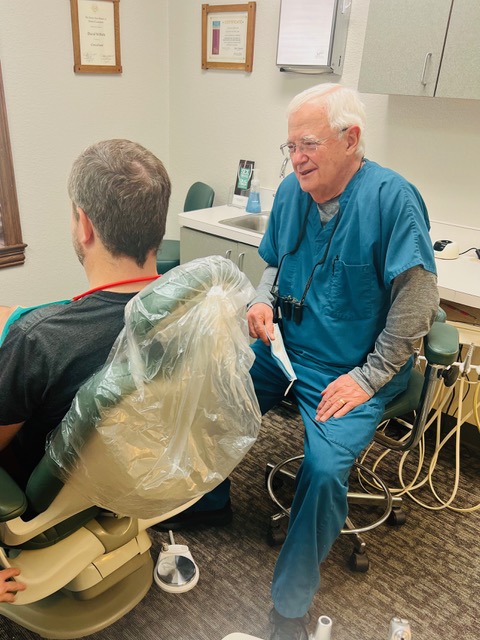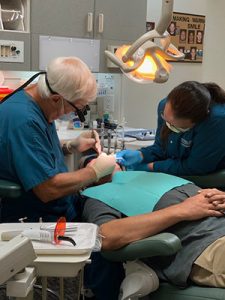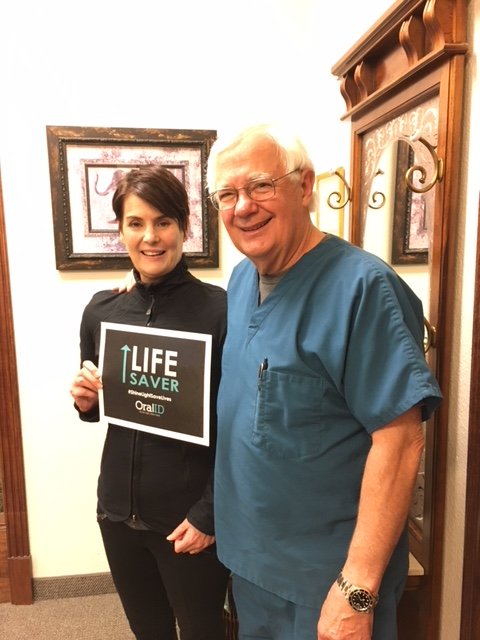periodontal gum disease treatment

Do you have swollen, tender, or inflamed gums? Do your gums bleed easily while brushing your teeth? If so, you may be suffering from periodontitis, also called periodontal gum disease. An early visit to our office at the first signs of gingivitis can help prevent advanced periodontal gum disease. Dr. Wilhite has extensive training and necessary skills to effectively treat this serious gum disease.
What Is Periodontal Gum Disease?
Periodontal gum disease is an infection of the gum tissue surrounding your teeth. It is mainly caused by bacteria that accumulate under your gums. When these bacteria overstay their welcome in your mouth, they cause infection and inflammation in your gums.
Along with tooth decay, periodontitis is the number one dental health issue affecting Americans. The CDC estimates that more than 47% of all adults in the US suffer from some form of gum disease. Luckily, children are not generally affected by periodontal gum disease.
Men are more likely to suffer from periodontal gum disease than women (56% vs. 38%). Your chances of getting the disease increase with age; 70% of people above the age of 65 have periodontal disease. You are also more likely to get it if you are a regular smoker.
Fortunately, periodontal disease can be prevented if you detect it early and take proper treatment and precautions. This disease has multiple stages, starting from a simple infection before progressing into more severe forms that spread beyond your gums.
From Gingivitis to Periodontitis
We can divide gum disease into two forms Gingivitis and Periodontitis. Of the two, gingivitis is the milder early stage of gum disease. The important thing to note here is that everyone gets gingivitis at some point. Our mouths are always under assault from harmful bacteria. If you keep your teeth healthy and perform proper oral hygiene regularly, the bacteria does not have much chance to accumulate.
If you miss out on regular brushing and flossing, you get plaque on your teeth. It is a sticky mixture of food particles, other debris, and bacteria. When the plaque is not properly removed, it triggers your body’s immune system.
Once the immune system gets involved, your gums become inflamed. They become redder, puffier, and may start to bleed easily. Bleeding gums is a sure sign of infection – healthy gums never bleed. At this early stage, gingivitis caused by plaque build-up can be easily treated with a thorough cleaning and regular oral hygiene.
If you visit your dentist’s office regularly, the gingivitis will be caught early and promptly treated. When caught in time, we can clear it up in under two weeks with minimal medication. If you don’t practice good oral hygiene or visit a dentist periodically, the situation can get much worse.
The following things could happen:
- When plaque is not removed from your teeth, it will harden over time into a layer called “calculus” or “tartar”.
- In relatively healthy people, this calculus is deposited as a creamy yellow layer at the bottom of the tooth. This is called “supragingival calculus” – a dentist or hygienist can clean this off with relative ease.
- Over time, another, more serious type of calculus can form under your gums. This type is called “subgingival calculus” – it is black and not at all easy to spot.
- Black-colored calculus indicates that your gingivitis has progressed under your gum tissue and into the roots of the teeth. This leads to a far more severe form of gum disease called periodontitis.
What Is Periodontitis?
To put it plainly, periodontitis is what you get when you allow gingivitis and plaque to fester for a considerable period. Unlike gingivitis, the damage caused to your gums, teeth, and jaw by periodontitis is permanent.
Once you get periodontitis, you can only manage it and prevent it from causing further damage. Any damage already caused by the infection is usually irreversible. Periodontitis can be classified into four different stages, depending on how long the disease has been allowed to spread. They are:
Stage 1 – Early Periodontitis
The first stage of periodontitis is not easily spotted, since it has the same symptoms as basic gingivitis. You may experience bleeding from the gums, increased sensitivity, and puffy or discolored gums.
The real damage is being done below the gum line, in the area where certain fibers connect the roots of your teeth into the sockets. These fibers are called periodontal ligaments – when the inflammation reaches this area, these ligaments become permanently damaged.
In these early stages, you will not experience any severe pain or other notable symptoms. The limited damage to the roots and ligaments can be arrested if you visit a dentist at this stage. Treatment involves a process of deep cleaning.
The tartar and plaque are removed from the teeth and gums using special ultrasonic tools called scalers. These scalers use vibrations to remove most of the tartar deposits. The hygienist may also perform additional scaling for even deeper cleaning.
Stage 2 – Moderate Periodontitis
As we already noted, the damage done to your ligaments in the early stage is almost undetectable. Everything changes once you reach the second stage of periodontitis. In this stage, the bacteria will reach deeper levels around your tooth sockets, attacking the ligaments, tissues, and jawbone directly.
In early periodontitis, small gaps will develop between your gums and teeth. The maximum depth of these gaps is usually around 4 to 5 millimeters (less than 0.20 inches). By the time the disease progresses to moderate, the infection has burrowed deeper, creating more pockets of up to 7 millimeters (0.27 inches) between your teeth and gums.
At this stage, the bacteria may start attacking your jawbone. It may also enter your bloodstream and affect other parts of the body. The treating gum disease in stage 2 is identical to stage 1 – deep cleaning, followed by strict oral hygiene practices and more frequent visits to the dentist.
Stage 3 – Severe Periodontitis
This is where you start running the risk of losing your teeth due to periodontal disease. While there is still no pain at this stage, you may start seeing some additional symptoms:
- Bad taste in your mouth
- Bad breath
- Receding gums
- Loose or moving teeth
- Tenderness or soreness when you bite down
- And so on
Treatment at this stage can include many things based on the scale of damage. Some teeth may have to be replaced with dental implants. Apart from deep cleaning, you may require advanced periodontal surgery to remove the bacteria and infected tissue.
You will have to consult a periodontal surgeon, a specialist in treating gum diseases at all stages. They are best qualified to assess the scale of damage and decide the optimal treatment plan for severe periodontal gum disease control.
Stage 4 – Severe Periodontitis (Late-Stage)
By the time patients reach the final stage of periodontal disease, they may have already lost several teeth. The gums and jawbone are badly affected at this stage and can’t firmly hold the teeth in place.
The teeth may have prominent gaps, with individual teeth flayed out or drifting apart. The gums may be swollen and oozing, with severe bad breath and difficulty in chewing. Extreme cold sensitivity is yet another sign of advanced periodontal disease.
At this point, the damage to the gums and the jawbone may be irreversible. You will require multiple consultations with specialists ranging from periodontists to oral surgeons.
Naturally, you can expect the treatment at this stage to be quite elaborate. Some patients may choose to have full replacement of natural teeth with dental implants. Furthermore, even implants may not stay in place if periodontal disease is not treated.
For best results, you will require multiple consultations and strict adherence to directions from your dental surgeons. Late-stage periodontitis increases your risk of other health issues because the inflammation can spread to other parts of the body, including the heart and brain. You may also develop serious medical conditions or an existing health condition may worsen due to the harmful bacteria circulating in your bloodstream.
How Is Periodontal Gum Disease Diagnosed?
 Diagnosis of periodontal gum disease, especially in the early to moderate stages, is not easy since it shares the same symptoms as gingivitis. To accurately diagnose the current stage of your gum disease, a dentist will rely on the following methods:
Diagnosis of periodontal gum disease, especially in the early to moderate stages, is not easy since it shares the same symptoms as gingivitis. To accurately diagnose the current stage of your gum disease, a dentist will rely on the following methods:
First, the dentist will look at your dental health history and other medical conditions, oral hygiene habits, last known visit to a dental office, etc.
The next step is a visual examination of your mouth, gums, and teeth, looking for any signs of inflammation or excessive tartar build-up.
The dentist will then measure the gap between your gums and teeth, also called pocket depth. Here are the different diagnostic possibilities based on your pocket depth:
- 1–3 mm – healthy teeth and gums
- 4–5 mm – signs of early periodontal disease
- 5–7 mm – moderate periodontitis
If the checkup reveals pockets of infection below the gum line, the doctor may order further x-rays to see how deep the infection has progressed. Any bone loss due to severe infections will show up in these scans.
If the gum disease is in an advanced stage, you may have to consult other specialists like periodontists and oral surgeons.



Treatments for Periodontal Disease
There are many stages in the treatment of gum disease. Depending on the progress of the disease, some or all of the following measures may be necessary:
Oral Hygiene Instructions
The first step in gum disease treatment is improving your oral hygiene. The dentist will give you detailed instructions on the steps necessary to keep your mouth and gums healthy and clean. Options can include different brushing techniques, flossing techniques, and regular mouthwashes.
Professional Deep Cleaning
The key objective here is the removal of all plaque and tartar deposits in your mouth, both on the teeth and inside the gums. This is usually done through a combination of scaling and root planing.
- Scaling: The careful removal of plaque from your tooth and gums using either a handheld dental scaler or an advanced ultrasonic scaling instrument.
- Root planing: Immediately after scaling, the dentist will perform an even deeper cleaning of your dental root area using a curette, cleaning any pockets down there and smoothing things over.
Antibiotics
In more severe cases of swollen gums or persistent bleeding, the infection and inflammation may refuse to go away even after improved oral hygiene and deep cleaning. In such situations, the dentist may prescribe antibiotics.
Corrective/Restorative Surgery
In advanced periodontal disease, you may require surgery to remove deep-seated pockets of bacteria and debris. In situations where there is severe damage to the gums and jawbones, special reconstructive surgeries (such as flap surgery) using tissue from other parts of the body like the roof of your mouth may prove helpful.
Aftercare
Deep cleaning or surgery cannot protect you from periodontal disease. You will have to maintain strict oral health and hygiene habits to keep plaque and bacteria at bay. More frequent visits to your dentist may also be necessary to review the status of your gums and teeth.
Choose a Top-Rated Dentist for Periodontal Gum Disease Treatment
Two things are essential for effective protection against periodontal gum disease, and they both go hand in hand. To begin with, you have to pay attention to your dental health. Brush your teeth with proper technique at least twice every day, for a minimum of two minutes. Use dental floss or interdental brushes to reach those small nooks and gaps your regular brush cannot reach.
Most important of all, the American Dental Association recommends that you should visit your dentist at least twice every year. Only a trained dentist can quickly spot the early signs of gum disease. The sooner you catch it, the better your odds of avoiding lasting damage to your teeth and gums.
If you suffer from gingivitis, loose teeth, red or swollen gums, or the signs of periodontal gum disease, don’t put off your visit to the dentist. You can rely on our team of dental experts, led by Dr. Wilhite for all your periodontal health needs in Plano, Allen, Frisco, and other locations in the Dallas-Fort Worth metropolitan area.

